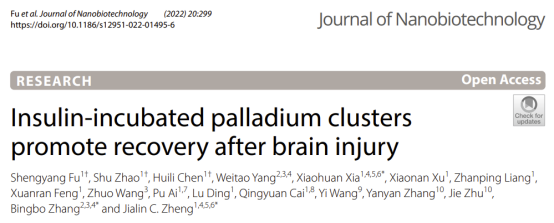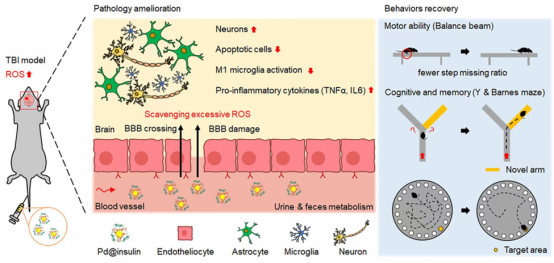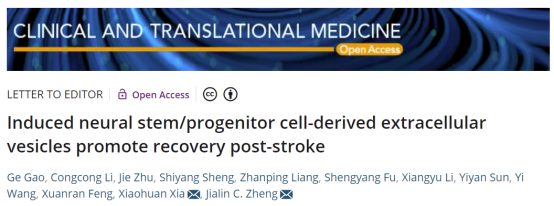Central nervous system disease is generally used to describe a board type of central nervous system related diseases such as acute brain injury, mental diseases and neurodegenerative diseases, the pathogenesis of which is extremely complex. At present, most diseases are short of effective treatment to block nerves and delay the progress of the disease. In view of the clinical difficulties faced in the diagnosis and treatment of central nervous system diseases, Professor ZHENG Jialin, researchers ZHANG bingbo and XIA Xiaohuan of Tongji University have been committed to doing research to solve difficult problems, and managed to develop new approaches for the treatment of neurological diseases based on naturally existing and synthetic nano materials.
New approach for the treatment of traumatic brain injury and depression based on ultra-fine nano enzymes
Reactive oxygen species (ROS) are important regulatory molecules of aging and pathological changes in the central nervous system, which can induce neuroinflammation, neurotoxicity and abnormal neural circuit function, leading to the onset of central nervous system diseases. Compared with small molecular compounds, synthetic nanozymes and natural enzymes (SOD and CAT) that scavenge ROS have the advantages of long half-life, high stability, low price and multi-target, but there are still problems such as complex synthesis and insufficient brain entry efficiency.
Professor ZHENG, ZHANG and XIA synthesized ultra-fine CeO2@BSA and Pd@insulin nanoclusters with reactive oxygen species (ROS) as the target through a convenient, green and efficient incubation approach of natural proteins (bovine serum albumin and insulin), which effectively overcame the shortcomings of the existing nano enzymes. The repairing effect of nanoclusters on nerve function and the improvement on nerve inflammation and injury of CeO2@BSA and Pd@insulin were verified in mouse models of acute and chronic central nervous system diseases such as traumatic brain injury and depression. Through the new nano enzyme synthesis technology, a series of new nano drugs against brain injury and depression were obtained, which provided a theoretical basis and technical means for promoting the clinical transformation and application of nano enzymes.

Paper published online in NANO LETTERS
Link to Paper: https://pubs.acs.org/doi/10.1021/acs.nanolett.2c01334

Paper published online in Journal of Nanobiotechnology
Link to Paper: https://jnanobiotechnology.biomedcentral.com/articles/10.1186/s12951-022-01495-6

ROS-targeted ultra-fine CeO2@BSA and Pd@insulin nanoclusters synthesized, effectively overcoming the shortcomings of the existing nano enzymes
Their research results were published online in NANO LETTERS and Journal of Nanobiotechnology on May 18 and June 25, respectively. The corresponding authors of the papers are Professor ZHENG Jialin, researchers XIA Xiaohuan and ZHANG bingbo, all from School of Medicine and Oriental Hospital of Tongji University. The first author is doctoral student FU Shengyang.
A new approach for treatment of ischemic stroke based on inducible neural stem cell exosomes
Neural stem cell (NSC) - derived exosomes (NSC-EXO) are new natural nano materials for the treatment of neurological diseases that have become hot topics for research in recent years. In vivo administration can achieve neuroprotective and nerve regeneration effects similar to NSC transplantation. However, neural stem cells, as exosome providers, are faced with such problems as ethical and religious disputes and the shortage of cell sources.
In order to break through this dilemma, Professor ZHENG Jialin and XIA Xiaohuan's research team obtained NSC like cells, induced neural stem cells (iNSC) through somatic reprogramming technology. It was discovered that iNSC-derived exosomes (iNSC-EXO) could penetrate the blood-brain barrier and enter the brain through the tail vein of mice, and playing a similar role as NSC EXO in promoting the functional repair of neural tissue and inhibiting neuroinflammation after ischemic stroke in mice. This work was the first of its kind to prove that INSC-EXO overcame the shortcomings and limitations of NSC-EXO in application, revealing the important clinical transformation value of iNSC- EXO as a substitute for NSC-EXO in the treatment of neurological diseases, which provided a new source of exosomes for the cell-free treatment of neurological diseases based on exosomes.
The research results were published online in CLINICAL AND TRANSLATIONAL MEDICINE on June 22. The corresponding authors of the paper are Professor ZHENG Jialin and researcher XIA Xiaohuan, and the first author GAO Ge, assistant professor of School of Medicine and Oriental Hospital of Tongji University.

Research results published online in CLINICAL AND TRANSLATIONAL MEDICINE
Link to paper: https://onlinelibrary.wiley.com/doi/10.1002/ctm2.936